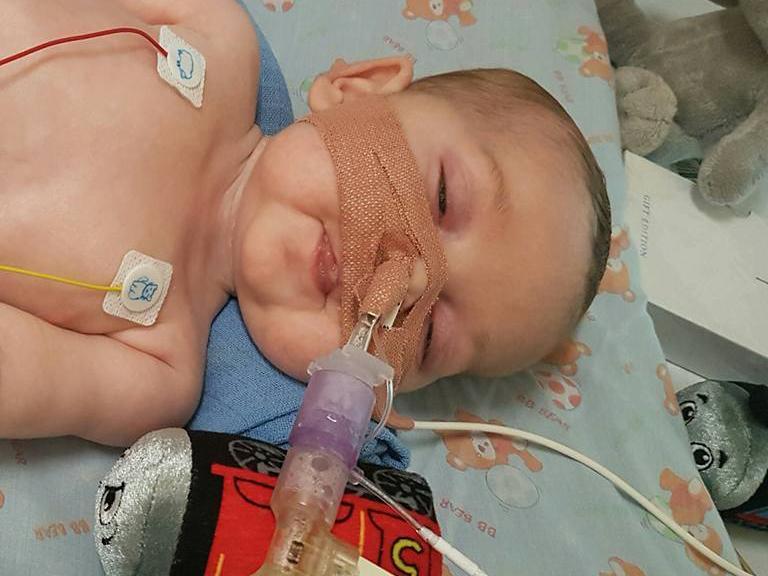Charlie Gard: Professor who offered to help baby has 'financial interest' in drug he was treating him with, says GOSH
Michio Hirano claims experimental drugs could have given the baby a chance of survival
Your support helps us to tell the story
From reproductive rights to climate change to Big Tech, The Independent is on the ground when the story is developing. Whether it's investigating the financials of Elon Musk's pro-Trump PAC or producing our latest documentary, 'The A Word', which shines a light on the American women fighting for reproductive rights, we know how important it is to parse out the facts from the messaging.
At such a critical moment in US history, we need reporters on the ground. Your donation allows us to keep sending journalists to speak to both sides of the story.
The Independent is trusted by Americans across the entire political spectrum. And unlike many other quality news outlets, we choose not to lock Americans out of our reporting and analysis with paywalls. We believe quality journalism should be available to everyone, paid for by those who can afford it.
Your support makes all the difference.The American doctor who offered to help Charlie Gard admitted he had a “financial interest” in the proposed treatment method, Great Ormond Street Hospital (GOSH) has said.
Michio Hirano said experimental drugs known as nucleoside therapy could give the critically ill baby a chance of survival, citing new results from a trial he had carried out on patients with a similar genetic disease.
The children's hospital, where the 11-month-old is on life support, said they were disappointed Dr Hirano had given evidence in court without having visited Charlie or having read his up-to-date medical information.
Great Ormond Street raised concerns that "not only had he not visited the hospital to examine Charlie but in addition, he had not read Charlie’s contemporaneous medical records or viewed Charlie’s brain imaging".
The doctor had also not "read all of the second opinions about Charlie’s condition (obtained from experts all of whom had taken the opportunity to examine him and consider his records) or even read the Judge’s decision made on 11 April,” the hospital said in a statement read out in the courtroom by Katie Gollop QC.
“Further, GOSH was concerned to hear the Professor state, for the first time, whilst in the witness box, that he retains a financial interest in some of the NBT compounds he proposed prescribing for Charlie.”
Charlie’s parents, Chris Gard and Connie Yates, have now ended their High Court fight to take their critically ill son to the US for treatment, bringing a five-month legal battle with doctors to a close.
Results of new medical tests on Charlie showing irreversible muscle damage meant the “window of opportunity had been lost” and the damage meant “the treatment could no longer be successful”, said the parents' lawyer Grant Armstrong.

Charlie, born on 4 August 2016, inherited the faulty RRM2B gene that affects the cells responsible for energy production and respiration, leaving him unable to move or breathe without a ventilator.
In an emotional statement outside the court, Mr Gard said the infant would not make his first birthday in less than two weeks.
He said the last year had been “the best, the worst and ultimately life-changing months of our lives” but “all our efforts have been for [Charlie]”.
“We are truly devastated to say that following the most recent MRI scan of Charlie’s muscles ... we have decided that it’s no longer in Charlie‘s best interests to pursue treatment and we will let our son go and be with the angels,” he said.
Dr Hirano, a professor of neurology based in New York, flew to London to examine baby Charlie on invitation from a High Court judge, having said the chance of the treatment's "clinically meaningful success" was around 10 per cent.
This estimate was based on the findings of a study involving nine patients with a faulty TK2 gene on life support, one of whom no longer needed a ventilator after receiving nucleoside therapy.
Speaking by video link, Dr Hirano told the court two weeks ago there was a “small but significant” chance the experimental treatment would improve Charlie’s condition, adding: “The only way to tell if the brain damage is reversible is by trying new therapy.”
He said he had devised a treatment plan for Charlie, who would be given four strong doses of nucleoside bypass therapy, which is given orally or injected.
There was a 56 per cent chance the treatment would pass the blood-brain barrier, he said, adding that five patients in his trial had reduced their time spent on a ventilator by eight hours or more.
“This is the best scientific data we have,” he said, adding he was prepared to extrapolate the TK2 findings to Charlie’s genetic deficiency. “These are small numbers, but with very rare diseases we must use every patient and gather as much detail from each patient as possible.”
He said he hoped a high dose of nucleosides, which are found naturally in the body, would enter Charlie’s cells, affect the mitochondria and prove “therapeutic”.
Ms Gollop called the case “desperate” but questioned the court taking evidence “from someone who has never, ever met Charlie Gard” and urged the doctor to read the previous court decision that details the position of the hospital.
A spokesperson for GOSH said: “We have always paid tribute to the extraordinary courage and strength of Connie Yates and Chris Gard and their devotion to their son.
"Today our hearts go out to them as they face the most difficult decision that any parent should ever have to make."

Join our commenting forum
Join thought-provoking conversations, follow other Independent readers and see their replies
Comments